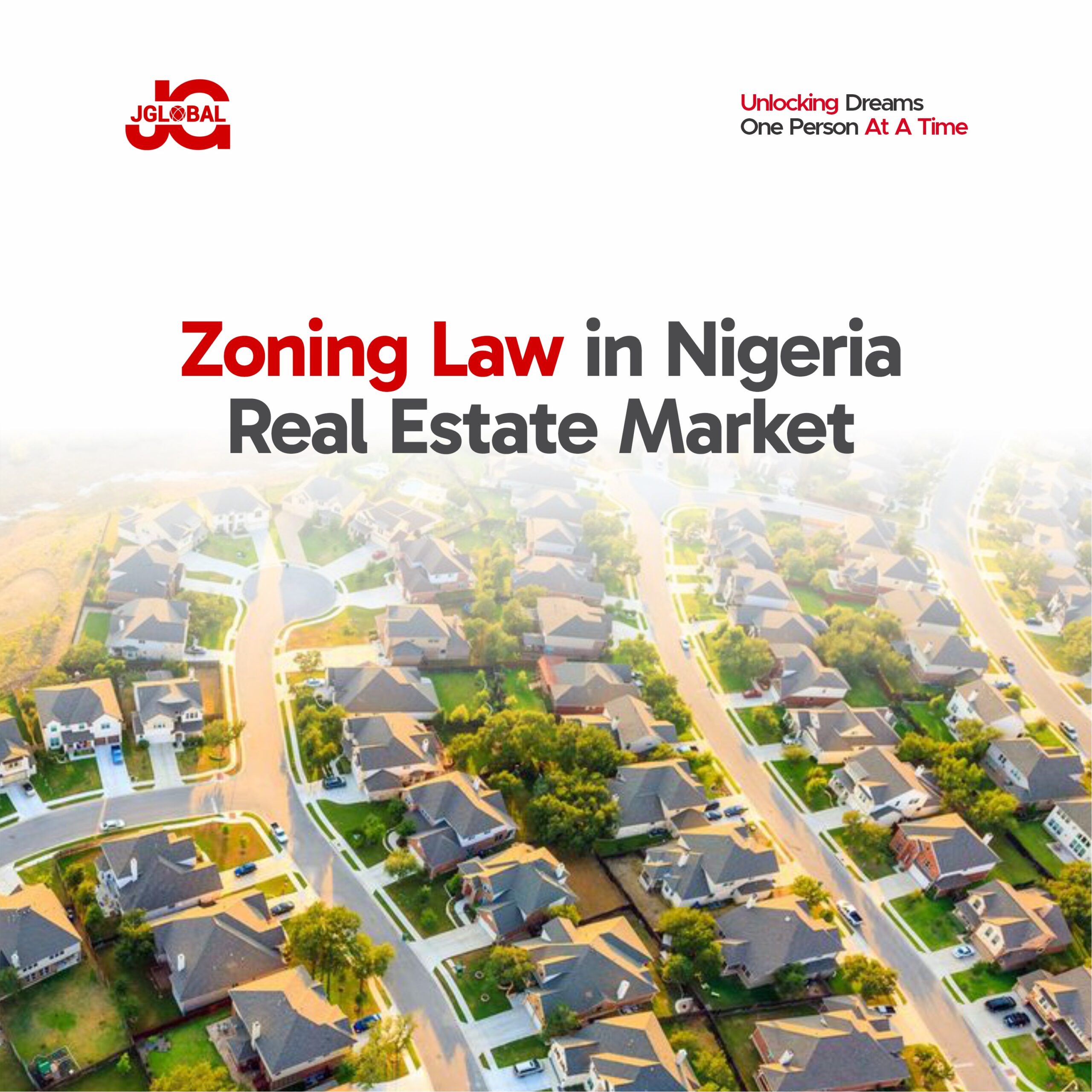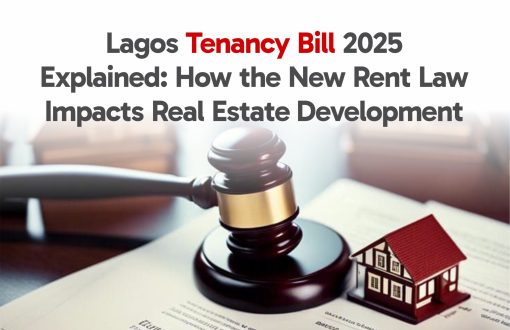Zoning Laws in Nigeria’s Real Estate Market

Introduction
Before buying land or starting a building project in Nigeria, it’s important to understand the zoning law in Nigeria. Far from being a mere technicality, zoning determines what you can build, and where. Ignore it, and you could face denial of approvals, demolition orders, or costly fines.
Let’s walk you through what zoning is, how it works, and what you need to know to safeguard your investment.
What Are Zoning Laws?
Zoning laws in Nigeria are government rules that specify how land in different areas can be used such as for residential, commercial, industrial, or institutional purposes. They help organize city growth and ensure buildings are developed in the right locations.
These laws stem from the federal Land Use Act (1978) and state regulations like the Lagos State Urban & Regional Planning and Development (Amendment) Law 2019, which empower authorities to control land use.
Zoning is enforced by state and local physical planning ministries. They issue permits, monitor compliance, and, if necessary, enforce demolition of unauthorized developments.
Recommended: The key regulatory bodies in Lagos that govern real estate development
Types of Zoning Laws
Under the zoning law in Nigeria, land is classified into different zones based on what kind of development is allowed in each area. Understanding these categories helps you avoid building the wrong project in the wrong place, something that could lead to denied permits or even demolition.
Below are the most common types of zoning in Nigeria.
- Residential zoning
This applies to land meant for housing. This includes detached houses, duplexes, bungalows, townhouses, and apartment buildings. The zoning law in Nigeria often limits the height of buildings in these areas, controls density, and restricts non-residential activities. You can’t just turn a residential plot into a nightclub or open market without official change-of-use approval.
- Commercial zoning
This type covers spaces intended for business activities such as shops, office buildings, banks, restaurants, and shopping complexes. The zoning law in Nigeria allows for higher foot traffic and parking facilities in these areas, but may also place restrictions on signage, noise levels, and the type of commercial activities allowed. You’ll often find commercial zoning along main roads or inside designated business districts.
- Industrial zoning
This is reserved for factories, manufacturing plants, and heavy-duty workshops. These zones are usually located far from residential areas because of noise, waste, or environmental concerns. According to the zoning law in Nigeria, industrial activities are not permitted in residential or institutional zones, and vice versa, to protect public safety and ensure infrastructure like power and drainage can support the operation.
- Institutional zoning
This is assigned to land used for public services such as schools, hospitals, government offices, and religious buildings. The zoning law in Nigeria sets special rules for these areas, including spacing requirements, access roads, and proximity to other public services. You can’t legally build a shopping mall on a plot that’s zoned for a hospital without going through the official conversion process.
- Conservation or green zones
These are areas where development is heavily restricted or completely prohibited to protect the environment. These zones often include wetlands, natural parks, flood plains, or coastal buffers. The zoning law in Nigeria plays a key role here by helping prevent environmental damage, controlling erosion, and reducing the risk of flooding especially in areas like Lagos where water-related issues are common.
- Agricultural zoning
This refers to land set aside specifically for farming, livestock, and other agricultural activities. Under the zoning law in Nigeria, this type of land is protected for food production and rural development. It is commonly found in rural or peri-urban areas and is not meant for residential estates, commercial buildings, or industrial projects. If a buyer intends to use agriculturally zoned land for a different purpose like building houses or setting up a factory, they must apply for a formal change of use through the state’s physical planning authority. Ignoring this process can lead to permit denials, enforcement actions, or even land repossession.
Recommended: How to make Agricultural Real Estate work without becoming a farmer
Each of these zoning types serves a specific purpose, and once a piece of land is classified, it can only be developed according to that purpose unless an official change-of-use is granted by the appropriate planning authority.
Challenges Buyers and Investors Face in Zoning
Many buyers discover zoning issues too late and pay for it. Here are some common pitfalls under the zoning law in Nigeria:
- Denied permit applications when building proposals don’t match the zone.
- Demolitions or stop-work orders for unapproved structures. A year ago, Lagos carried out such measures after granting a 90-day grace period to non-compliant buildings.
- Flooding and drainage issues when buildings are too close to waterways, zoning setbacks exist to prevent this.
- Legal disputes involving neighbors or community objections due to zoning violations.
Recommended: Ground Rent in Nigeria
Practical Steps for Buyers and Investors to Navigate These Zoning Laws
- Confirm zoning designation
Visit the State Ministry of Physical Planning or download digital zoning maps to verify what’s permitted on a plot of land. - Match your project to the zoning
Plan your development to comply with zoning requirements including building type, coverage, height, and setbacks. If your plans require a change of land use, apply formally through the appropriate channels. - Work with professionals
Use certified realtors, architects, surveyors, and environmental consultants who understand zoning law in Nigeria and its impact on design and permitting processes. - Apply for a Planning Permit
Required under laws like the 2019 Lagos Planning Regulations. You’ll need thorough documentation: site plan, architectural drawings, environmental impact assessments, survey plans, and zoning report. - Public notification and compliance checks
Be prepared for public objections or site inspections during the approval process. Early preparation is key. - Monitor construction after approval
Stick to the approved plans through construction and register certificates of completion and compliance required before occupancy.
Recommended: The comprehensive guide to understanding survey plans
Impact of Non-Compliance with Zoning Laws
Ignoring the zoning law in Nigeria brings serious consequences such as:
- Demolition of structures, often at the owner’s cost.
Demolition of a property. (Facebook)
- Legal penalties, including fines or criminal charges for dangerous buildings. These can be enforced without notice or compensation.
- Civil lawsuits and financial damages from affected parties.
- Loss of investment when developments have to be altered, halted, or destroyed.
The Lagos State Building Control Agency has specifically noted demolitions often occur when developers exceed prescribed zoning standards.
Conclusion
In today’s Nigerian property market, the zoning law in Nigeria is not optional, it’s the backbone of any successful land purchase or development project. By understanding zoning laws and their implications, engaging qualified professionals, securing planning permits, and adhering to approved plans, you can protect your investment from costly enforcement actions.
Before you buy or build, prioritise zoning compliance through early due diligence. It’s the single most effective way to secure your land, avoid demolition, and ensure a smooth path to completion and occupation.
If you’d like help interpreting zoning rules for a specific plot or need step-by-step support, book a free consultation today. Subscribe to our weekly newsletter for more insights about Nigeria’s evolving real estate landscape.



